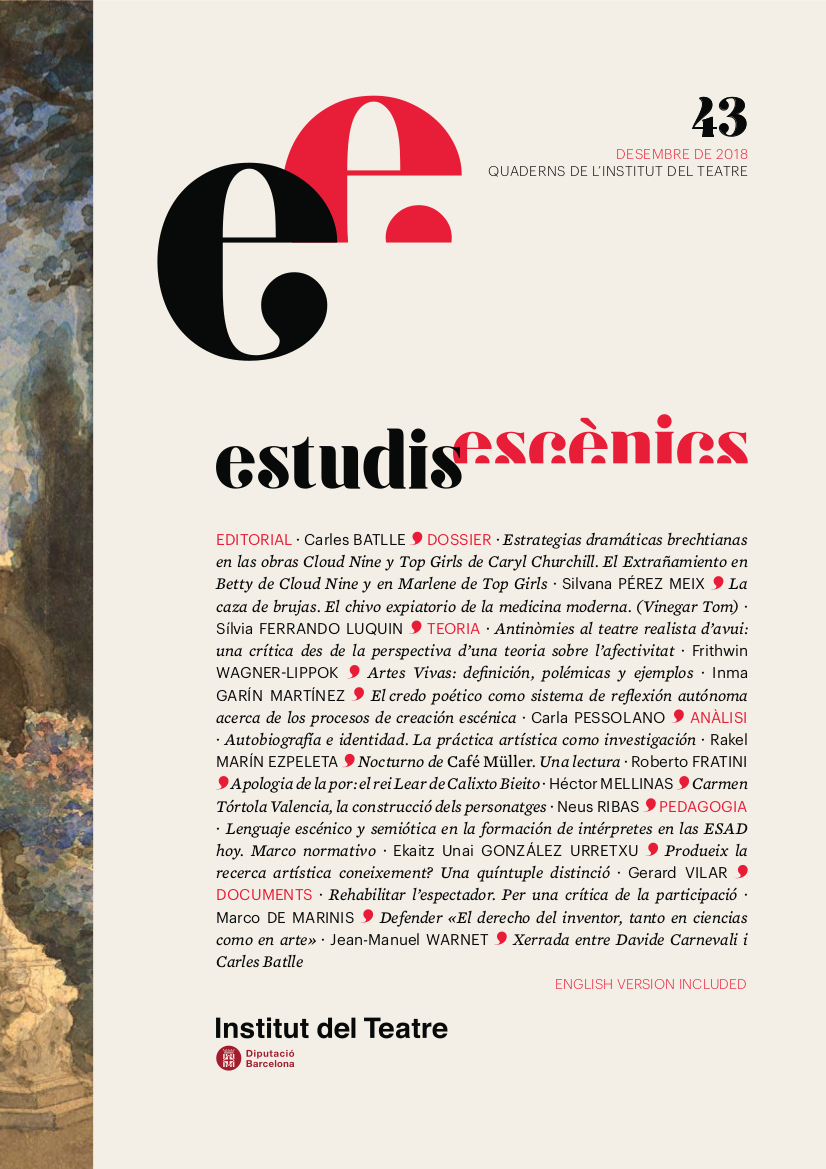Nocturno de Café Müller. Una lectura
Paraules clau:
Bausch, Tanztheater, teatro-danzaResum
En este trabajo se analizan las fraseologías, los objetivos poéticos y los temas
de Café Müller de Pina Bausch (1978), tratando de subrayar, por un lado, los
múltiples vínculos entre su poética y las formas de anacronismo en la cultura
alemana de los años sesenta y setenta, principalmente en relación con
la memoria de la Segunda Guerra Mundial y de las corrientes dominantes
del Ausdruckstanz, justificar por otro lado sobre una base estructural (a través
del análisis de algunos procedimientos innovadores como la repetición,
la desincronización, la alegoría) la fama de la obra como obra maestra del
Tanztheater contemporáneo y como paradigma de la llamada «dramaturgia
silenciosa».
Referències
Agamben, Giorgio. «Note sul gesto». En: Mezzi senza fine. Note sulla política. Turín: Bollati Boringhieri, 1996, p. 45-53.
— Il regno e la gloria. Per una genealogia teologica dell’economia e del governo. Turín: Bollati Boringhieri, 2009. Homo sacer; II, 2.
Auerbach, Erich. «Figura». En: Studi su Dante. Traducción de María Luisa Pieri Bonino. Edición orginal en Instanbuler Schriften, 1944. Milán: Feltrinelli, 1963, p. 174‑220.
Banes, Sally. «Steve Paxton: Physical Things». Dance Scope. (Nueva York: American Dance Guild), 13 (invierno/primavera 1979), p. 11-25.
Baudrillard, Jean. Le strategie fatali. Traducción de Sandro d’Alessandro.
Edición original en Grasset & Fasquelle, 1983. Milán: SE, 2007.
Benjamin, Walter. Das Passegen-Werk (Vollständige Ausgabe). Fránkfurt: Suhrkamp, 1991.
Bentivoglio, Leonetta. Il teatro di Pina Bausch. Milán: Ubulibri, 1985.
— «L’altra danza di Pina Bausch». En: Vaccarino, Elisa (ed.): Pina Bausch. Teatro dell’esperienza, danza della vita. Atti del Convegno Internazionale. Torino, 2-5 giugno 1992. Génova: Costa & Nolan, 1993, p. 161-168.
Bergson, Henri. Le rire. Edición original de 1899. París: Flammarion, 2013.
Böll, Heinrich. Frauen vor Flusslandschaft. Edición original de 1985. Colonia: Kiepenheuer & Witsch, 2007.
Casini Ropa, Eugenia. «La Cultura del corpo in Germania». En: Casini Ropa, Eugenia (ed.): Alle origini della danza moderna. Bolonia: Il Mulino, 1990, p. 81‑100.
Céline, Louis-Ferdinand. Rigodon. París: Gallimard, 1969.
Climenhaga, Royd The Pina Bausch Sourcebook. The Making of Tanztheater. Nueva York: Routledge, 2013.
Didi-Huberman, Georges Ante el tiempo. Historia del arte y anacronismo de las imágenes. Traducción de Antonio Oviedo. Edición original en Les Editions de Minuit, 2000. Buenos Aires: Adriana Hidalgo Editora, 2006.
— La imagen superviviente. Historia del arte y tiempo de los fantasmas según Aby Warburg. Traducció de Juan Calatrava. Edición original en Les Éditions de Minut, 2002. Madrid: Abada, 2009.
Fratini Serafide, Roberto. A contracuento. La danza y las derivas del narrar. Barcelona, Mercat de les Flors: 2012.
— «Vacabimus. Appunti per una cinesiologia dantesca». En: Buttà, Licia; Carruesco, Jesús; Massip, Francesc; Subías, Eva: Danses imaginades, danses relatades. Paradigmes iconogràfics del ball des de l’antiguittat clàssica fins a l’edat mitjana. Tarragona: ICAC , 2014, p. 85-108.
— «Torbellinos inteligentes. La filosofia de la danza, entre ensueños dinámicos e ideas fijas». En: Fratini, Roberto; Polo, Magda; Raubert Nonell, Bàrbara: Filosofía de la danza. Barcelona: Universitat de Barcelona, 2015, p. 37-93.
Gradinger, Malve. «Pina Bausch». En: Bremser, Martha (ed.): Fifty Contemporary Choreographers. Londres: Routledge, 1999, p. 25-29.
Guilbert, Laure. Danser avec le IIIe Reich. Les danseurs modernes sous le nazisme. Bruselas: Éditions Complexe, 2000.
Heidegger, Martin. Zur Sache des Denkens. Edición original en Niemeyer, 1969. Jena: Verlag Vittorio Klostermann, 2007.
Hillman, James. Il sogno e il mondo infero. Traducción de Paola Donfrancesco. Edición original de 1979. Milán: Il Saggiatore, 1988.
Hoghe, Raimund. Pina Bausch. Histoires de Théâtre dansé. Traducción de
Dominique Petit. Edición original en Suhrkamp Verlag, 1986. París: L’Arche, 1987.
Laban, Rudolf. The Mastery of Movement. Londres: Macdonald & Evans, 1960.
Lyotard, Jean-François. Discours, Figure. París: Klincksieck, 1971.
Matté Blanco, Ignacio. L’inconscio come insiemi infiniti. Traducción de Pietro Bria. Turín: Einaudi, 2000.
Müller, Hedwig; Servos, Norbert. «Expressionism? Ausdruckstanz and the
New Dance Theatre in Germany». Dance Theatre Journal, 2, n. 1, (1984), p. 107.
Muray, Philippe. Céline. París: Seuil, 1981.
Novack, Cynthia J. Sharing the Dance. Contact Improvisation and American Culture. University of Wisconsin Press, 1999.
North, Marion. «Shadow Moves». En: Mc Caw, Dick: The Lab
an Sourcebook. Nueva York: Routledge, 2011, p. 257-264.
Orlando, Francesco. Gli oggetti desueti nelle immagini della letteratura. Rovine, reliquier, rarità, robaccia, luoghi inabitati e tesori nascosti. Edición original de 1993. Turín: Einaudi, 2015.
Partsch-Bergsohn, Lisa. The Makers of Modern Dance in Germany. Princeton Book Company. 2003.
Paxton, Steve. «Contact Improvisation». The Drama Review, 19 (T-65, marzo 1975), p. 40-42.
Schefer, Olivier. «Qu’est-ce que le figural?». Critique, 630 (noviembre 1999), p. 912‑925.
Servos, Norbert. Pina Bausch ou l’Art de dresser un poisson rouge. Edición original en Kallmeyerche Verlagsbuchhandlung, 1996. París: L’Arche, 2001.
Valéry, Paul. Degas Danse Dessin. Edición original de 1938. París: Gallimard, 2016.
Walther, Suzanne K. The Dance of Death. Kurt Jooss and the Weimar Years. Edición original de 1995. Nueva York: Rutledge, 2013.
Žižek, Slavoj. El acoso de las fantasías. Traducción de Francisco López Martín. Edición original en Verso, 2011. Madrid: Akal, 2011.














